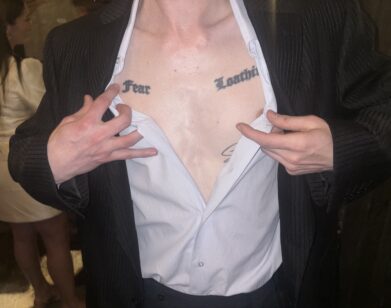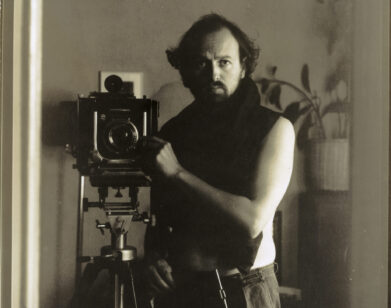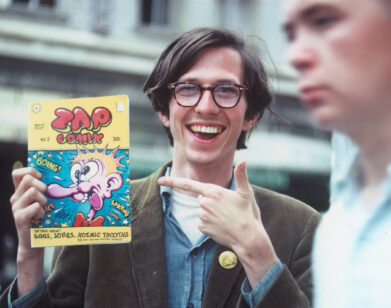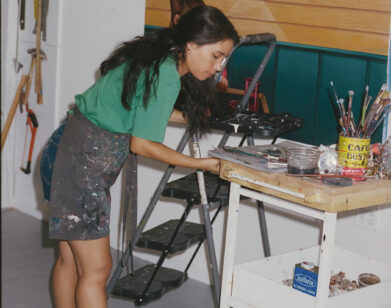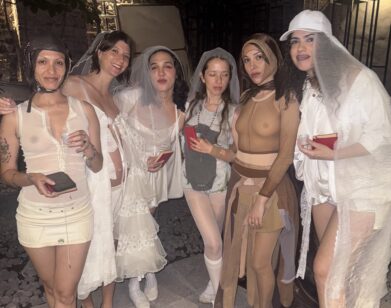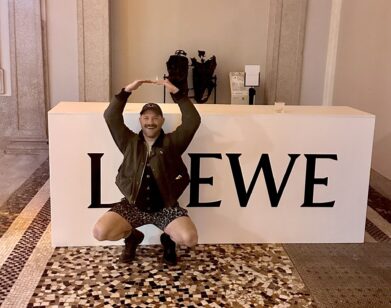Cate Blanchett
Everybody knows that Cate Blanchett is a good actress. In fact, she’s one of the best. She can play queens. She can play spies. She can play emotionally confused schoolteachers who have affairs with their students. She can play Spock-eared nymphs. She can play Bob Dylan. And she can do it all on stage, on film, on television, and probably on YouTube, if the circumstances demand it. She’s gotten awards, yes, and recognition from all corners. In fact, just telling someone that Cate Blanchett is in a movie often inspires the response, “Oh, Cate Blanchett,” which has become international shorthand for, “Oh, Cate Blanchett agreed to act in this film, so it must be of some quality. Even if I wind up not liking it or not even understanding it, there must be something to it, or else Cate Blanchett would not have done it.” So, Cate Blanchett: good actress.
But there’s something about what Blanchett does, how she thinks about things and goes about her business, that has less to do with being one of the best actresses, ever, of all time, and more to do with being an artist, which is the overarching theme of this issue. Of course, there are bits of Blanchett in all the women (and men) that she plays-there’s the porcelain skin, for one thing, and the betraying eyes that very often speak before her characters do. But that’s where the similarities usually end. And just as there is a difference between someone who paints and someone who makes paintings, or a pile of quarters on the floor and an installation, there is a difference between being a movie star who appears in films and being an actor who creates characters. Sometimes it’s a difficult difference to decipher, and the most interesting art often challenges the boundaries of what art can be. But watching Blanchett do what she does, the difference somehow seems more evident.
Blanchett’s latest film, The Curious Case of Benjamin Button, was directed by David Fincher. The movie was shot in New Orleans and is based on an F. Scott Fitzgerald short story. As the title would suggest, the plot involves a man named Benjamin Button (played by Brad Pitt) who is mysteriously growing younger with each passing day, and his doomed relationship with the love of his life, Daisy (Blanchett), as they continue to age in opposite directions. And in January, Blanchett and her husband, playwright Andrew Upton, commence three-year terms as co-artistic directors of the Sydney Theatre Company in their native Australia. Jack White recently caught up with the 39-year-old Blanchett at the theater, where she took a break from rehearsals for a production of The War of the Roses to talk about, among other things, the art of performing.
JACK WHITE: Hi, Cate.
CATE BLANCHETT: How are you, Dad?
JW: I’m good. How are you, Mom?
CB: Good. I haven’t spoken to you since . . . I think Karen [Elson, White’s wife] was still pregnant when we spoke last.
JW: Yeah. We’ve got a girl and a boy now. Scarlett White and Henry Lee White. They’re holding each other’s hands right now. Each moment doesn’t last long enough, does it?
CB: I know. That’s why we just have to have more of them. The world is so massively overpopulated, but if you’re halfway decent-looking and you make nice ones, then I think it’s probably your responsibility to make more.
You see people sweat. You see them breathe. They can offend and hopefully terrify you, and on a good night, you’ll laugh, and you’ll cry.Cate Blanchett
JW: You can always give them away if they don’t work out.
CB: Or if they’re redheads. But, then again, yours probably are.
JW: We’ll keep those, yeah.
CB: Our little one, Iggy, is 6 months old. I’m waiting for Andrew to notice that he’s got a little red fringe.
JW: Iggy.
CB: It’s very Catholic-Ignatius.
JW: That’s gorgeous.
CB: Of course one thinks of Iggy Pop. But it’s Ignatius Loyola.
JW: My confirmation name was Septimus.
CB: Septimus!
JW: Yeah. But the bishop laughed at me when he confirmed me because I was the seventh son in my family. Talk about lots of kids. So I wanted to pick a name that dealt with that number. I found it in an old copy of the Bible. But Ignatius is a good one-maybe I should have picked that. So, to start off, I did some Internet research. I’m going to tell you what I’ve learned about your history, and you can tell me what is true and what is not. Okay, so you were born in Mexico and orphaned at age 1.
CB: Yes.
JW: And then again at age 3.
CB: Shit. That’s on the Internet?
JW: Eventually, you were raised by either shepherds or Sherpas on Christmas Island-I don’t know which one because I think someone misspelled something.
CB: And then I was kidnapped and raised by a Mormon family.
JW: Well, it says here that you slept every night with a baby goat in your arms until you were 22.
CB: Twenty-three.
JW: Then you attended an all-boys school in New Zealand, only to experience the opposite when you were transferred to an all-girls school in Australia.
CB: Well, such is the life of a hermaphrodite.
JW: After discovering America and claiming it for Australians everywhere, you set about learning to type. You never completed training in this, but it did get you to use your hands, which of course led to acting as a hand model in a series of soap commercials in France. Then you decided to drop out of high school and look for a real job, so you became an actress. How does it end, though?
CB: Then you run a theater company with your friends and your husband . . .
JW: [both laugh] I wanted to ask you what aspects of the theater company in Sydney you’re involved with. Are you interested in the lighting? Let’s start there.
CB: Basically, we’ve programmed 12 one-woman shows based around the various chapters of my life, and for some reason-and I cannot work out why-our audience numbers have been dropping. [laughs] But, no, it’s a huge company. For me, I think the bigger something is, the more difficult it is to make it nimble and fleet afoot. So that’s kind of been our mission. There’s not a long, entrenched tradition of theatergoing in Australia. People love events-they love performances, they love music-and I think Australians are great entertainers. But there’s this patina of weariness regarding any theatrical endeavor, so I think our job has been to kind of enhance the event atmosphere, bring excitement around actually coming to the theater. We are on a wharf. We’re on the sort of seedy side of the bridge, and we have been having sessions once a month to get some music in the foyer, just to kind of rough it up a bit and create an atmosphere around the shows. Because our people need to see something good. The company has done great work in the past. It used to spill out into the foyer, and now there’s nowhere to go and nothing to latch onto-you kind of just go home, and you forget the experience, or it sort of rests in isolation. And theater is all about foyers and conversation and digesting what you’ve seen. That’s a long-winded answer to your question, but it’s been mammoth
Is it the definition of limbo where you can see your beloved but you can never actually touch them and you’re constantly circling one another?Cate Blanchett
JW: I always question how much you get involved in micromanaging something like that. If you get involved all the way down to the lighting of the foyer . . . See, that’s what I would get obsessed about if I was in your position. I would want the lighting to be perfect out in that foyer so that those conversations could take place. Do you find yourself doing that?
CB: Well, the casting is, like, 75 percent of the job. So if you’ve got great people around you, then overmicro-managing can actually strangle the flow of things.
JW: Sometimes it can be fulfilling, though, to micro-manage-and not in a control-freak kind of way, but in a way where you get a taste of all the different departments. You find yourself a part-time carpenter, for example, when you have no rhyme or reason for being in that part of the world to begin with.
CB: Yes. When you’re directing something, you absolutely have to be involved in all layers of the process. It’s quite precarious in a way. But it’s been great to just step away from the filming rhythm for a while, just to take stock.
JW: It takes a lot of time to make a film.
CB: It took a lifetime to make Benjamin Button.
JW: Oh, it looks like it took a long time, from what I’ve seen. I don’t know where your character stands in relation to Mr. Button, but I got a sense that there’s almost a twist on this Harold and Maude [1971] sort of love relationship between people of different ages.
CB: Yeah. It plays on that. I mean, I always kept thinking about that image of the lovers encircling one another in-I don’t know which tier of hell it is-is it Purgatory? Is it the definition of limbo where you can see your beloved but you can never actually touch them and you’re constantly circling one another?
JW: That’s not good. What is that state called?
CB: It’s called torment. And, the weird thing is that some people actually create those relationships on earth.
JW: I was going to say a word to you that I thought we could talk about: erotomania.
CB: Erotomania?
JW: Erotomania: A rare disorder in which a person holds a delusional belief that another person, usually of higher social status, is in love with him or her.
CB: You thought of me when you found that word?
JW: When I got to this word I also found out that you played Ophelia in Hamlet, and I was just thinking about Ophelia. I went back and was reading some of her parts, because there’s a debate over whether she killed herself or whether she slipped and fell, and I wanted to know what you thought.
CB: She was pushed.
JW: You think she was pushed.
CB: Well, if someone stands on the ledge and they slip, did they kill themselves or was it an accident? I think Ophelia stood on the ledge.
JW: She stood on the ledge. Some people consider the way Shakespeare was writing about Ophelia as erotomania-that she was delusional in thinking that Hamlet was in love with her. But I don’t think so.
CB: But that’s why so many people want to play Hamlet: because it’s a completely demarked role, and the actor playing it has to be prepared, through the language, to allow the audience to see into who he is. So with each Hamlet-and everyone who is brave enough and, frankly, talented and skilled and emotionally capable enough to do that-the spirit of the actor will profoundly influence the role and, therefore, influence the way it’s played with Ophelia. But don’t you find that if you’ve been around someone who’s in extreme grief or crisis or pain, that they become transformed through the physical nature of what’s happening to them? It’s always felt that way to me. In the production that I was in, we had an extraordinary Hamlet, Richard Roxburgh. And it felt like, as Ophelia, I was looking at a Hamlet who was becoming increasingly unrecognizable to me. He was being transformed.
JW: His Hamlet was becoming unrecognizable to your Ophelia?
CB: Yes. The person that Ophelia was trying to speak to was a Hamlet that was becoming remote. So in the present, perhaps, he was speaking to her like she was an erotomaniac. That’s a good word. Now you’re going to read something about some interview I’ve given where all I’m talking about is erotomania, as if it’s something that I have discovered on one of my trips to the mountaintop . . .
JW: This is a psychological opinion, but someone once told me that you can only desire something that you’ve already had in your life.
CB: Did this come from a Buddhist?
JW: I don’t know. But the thing is, if that’s the case, then when you fall in love with someone, you’re not really changing at all. You’re really just reliving something that already happened at some point.
CB: That would be very comforting to think that. I think there are certain echoes in life. But I think those echoes are probably much more to do with what’s going on in your sort of neuro-linguistic processing. For example, if you’ve said something that you’ve said before or that you’ve heard your parents say. I think my thinking about it is much more scientific than spiritual. I would absolutely love to have the comfort of thinking that these things have somehow existed before or happened before, or that there’s a kind of collective store of experience. I would love to find that place-I just don’t necessarily know that it’s there. But on the subject of change, I reckon I used to seek out dangerous experiences in certain situations. But since I’ve acted more, I somehow have that sense of danger and the adrenalin rush that comes with it, in my work, so I don’t need to have it in my life as much. I do think, though, that as a species we have been bleaching out our passion. The situation of existing in extremes-and I don’t mean violent, dangerous extremes, but rather extremes of thought or living with contradictions-is kind of considered increasingly abhorrent and antisocial. I think that’s why good theaters are really important. They allow you to exist in a space with other people and deal with these things, and not in a passive way.
JW: Because you physically see everything happen.
CB: Yeah. You see people sweat. You see them breathe. They can offend and hopefully terrify you, and on a good night, you’ll laugh, and you’ll cry. And if it’s bad, you feel so cheated and so angry because you’ve been there and you’ve been actively participating in that fantasy that’s been unfolding. But if you go to a bad film, it’s just like, “Oh, that wasn’t so great,” because you’re not implicated in it. You don’t have to buy into it. Theater is a space where you cross over from everyday life, because there are real people in that moment moving in front of you-you’re being invited to believe in a story and cross that bridge.
JW: I think we should all feel lucky and blessed that people are still, in this day and age, getting in their cars with other people and driving to a location and paying money to sit in a theater and watch a play. With all the media that’s out there and all the other things that are going on in people’s living rooms right now that could distract them, they are still going out and watching live music or watching the symphony or watching theater.
CB: Particularly with what’s going on in the world, which is going to hell in a handbag. Maybe there’s an opportunity there for people to kind of reengage with those human experiences . . . Well, look, I hope. But there’s something in that space that you’re talking about that really has to do with your body. When you go to a concert-or, I would imagine, perform in one-it’s really all-consuming. Obviously, you’re intellectually engaged somehow. But it bypasses that and goes straight to the body. I think rock stars and dancers-and physical actors as well-exist in that space because those boundaries are somehow broken down between what we think and what we feel.
JW: The thing I love about live performance the most, though, is that the doors are closed, the lights are turned down, and the audience has to be reverential to what’s happening onstage. It’s not like being at home where you can change channels, fast-forward, turn it off, put the book down, or walk away. It’s this phenomenon where we all, as a community, go to church and sit and experience this thing together.
CB: I’m hoping it’s going to have even more of a resurgence. But I think you’re right, that sense of reverence is to do with surrender. You have to surrender less when you see a film than when you go and see something live.
Theater is a space where you cross over from everyday life, because there are real people in that moment moving in front of you.Cate Blanchett
JW: I’m assuming from what you said that you, of course, like to go to the theater with other people.
CB: Yes. You have to be part of an audience.
JW: You can’t really watch a theater performance by yourself. You can watch a movie by yourself, though.
CB: You can, yeah, because your connection with the screen is really intimate, and the story is only being told to you. When you go to a concert, part of being there is that you’re all hearing the same thing. It’s about being in a crowd. If you go to a gig and there are two people there, then it’s not the same thing.
JW: Let me circle back for a second. What about this new form of communication that’s happening right now on the Internet? When you go to the theater with your friends, and you stand in the foyer and you communicate about what you’ve just witnessed and you exchange ideas and thoughts about what went on, you have a responsibility-when you’re face-to-face with people, you’re responsible for what you say. You have to defend it and stand behind it. On the Internet, though, you don’t have to do that. Journalists, film critics, theater critics, music critics, 12-year-olds-they all become one voice in a sense. Should creative people be frightened of this kind of communication without responsibility?
CB: I think the downside of the Internet is that speaking-or writing-has become the point in and of itself. I’m of the opinion that it’s okay to be silent, to not speak if you don’t have anything to say. Someone was talking to me the other day about her teenage daughter who is very creative. Now, to become a painter or a sculptor or a graphic designer is quite an isolated way to spend your life. But this girl’s passion, she said to her mother the other day, was being with her friends, and she said there’s this sense that she doesn’t exist without the other people there. It seems like people increasingly just can’t be by themselves because they’re so used to having an epicenter on the Internet that actually exists for other people. Until someone clicks onto your Facebook page, it doesn’t mean anything.
JW: Right, you don’t exist.
CB: Then, suddenly you have 175 friends. But it’s important to be aware that this is a big part of the way the world is communicating and of the effect that it is having on people’s thinking.
JW: Well, when you go out to give a performance, you’re putting yourself out there into the world to share with other people. If you just do it in your room by yourself, no matter how beautiful it is, is it dead?
CB: It’s always better in your room. It’s always perfect in your room. And then other people get in the way.
JW: It’s dead, though, in your room. It doesn’t live.
CB: It doesn’t mean anything beyond you having a little narcissistic moment. It has to be for other people. That’s the thing about the audience-it’s a cliché, but they do complete the meaning of it. There’s that fantastic moment in King of Comedy [1983] when Rupert Pupkin [played by Robert De Niro] is delivering a speech, and there’s a laugh track, and you think he’s doing his routine to a filled-up auditorium, but it’s just this wallpapering of people. So, yes, that may be an avenue that we go down as humans quite frequently, where we imagine our way into it.
JW: But when there are only 10 people there and there are supposed to be 300, that’s an interesting challenge. It’s almost like you can share more, or something more beautiful can happen, because there’s an emptiness in the room that you can fill up. When I go to see a Broadway show and watch someone perform who says the same lines every night, I get jealous in a couple of different ways. I want to know what it’s like to do the exact same thing every night, or twice a night, or three times on Saturday, like they do in Vegas, because I’ve never gone out and played the same set twice. And I want to know what it’s like to try to find new life in the exact same words every time.
CB: But, see, I’ve thought that so much about people who have a hit song, and then that’s the song they have to play over and over. I thought about that so much playing Bob Dylan [in I’m Not There, 2007].
JW: Well, Dylan never played the songs the same way twice.
CB: Well, no. But what you’re trying to do as an actor is somehow trick yourself into believing that these words have never been said, and so you’ve got to discover them for the first time.
JW: Have you ever acted in a small room of only, like, 10 people? And I don’t mean at a read-through of a script or something.
CB: Probably when I was drunk. [White laughs] Have you done something like that?
JW: Well, I guess I was comparing it in my mind to playing a song for people on a piano in a small room-maybe at a party or something like that where you’re performing and the room is small and you can connect easily. I was just wondering what it would be like to act in a small room of people like that.
CB: Fortunately, as an actor, people don’t necessarily ask you to do that: “Can you do your Lady Macbeth?”


